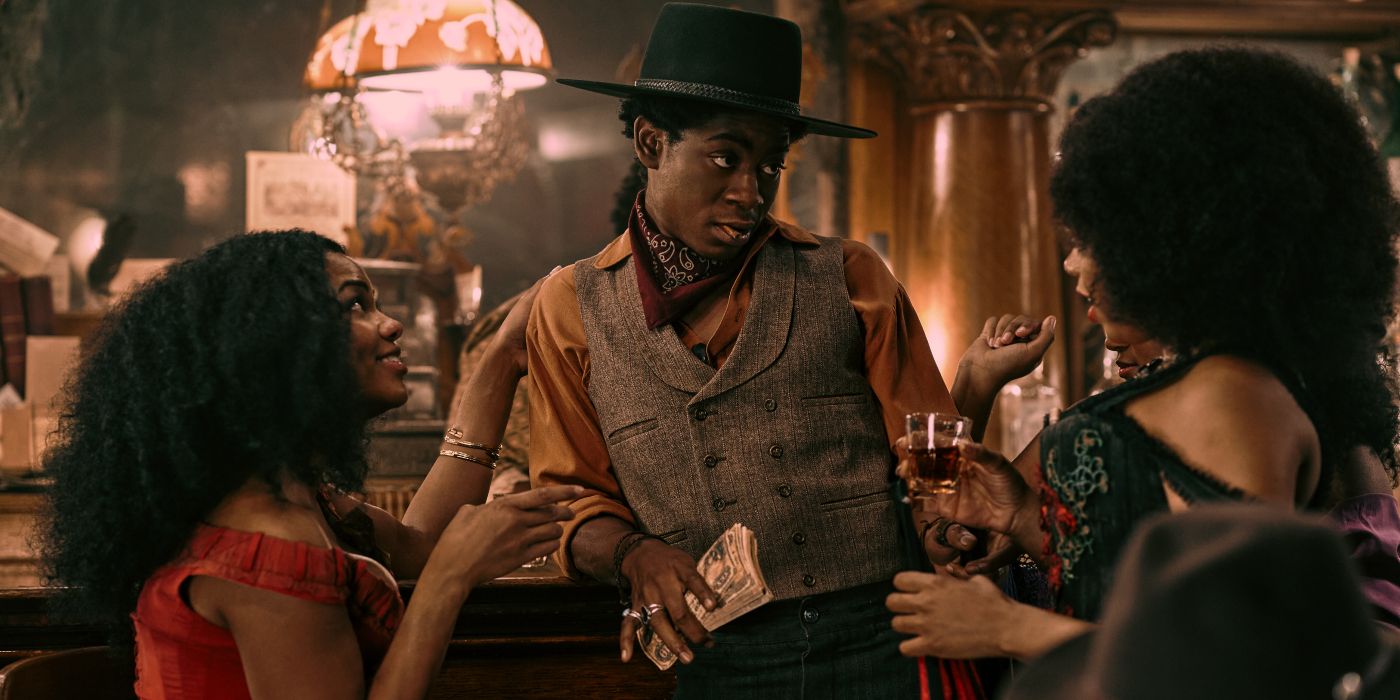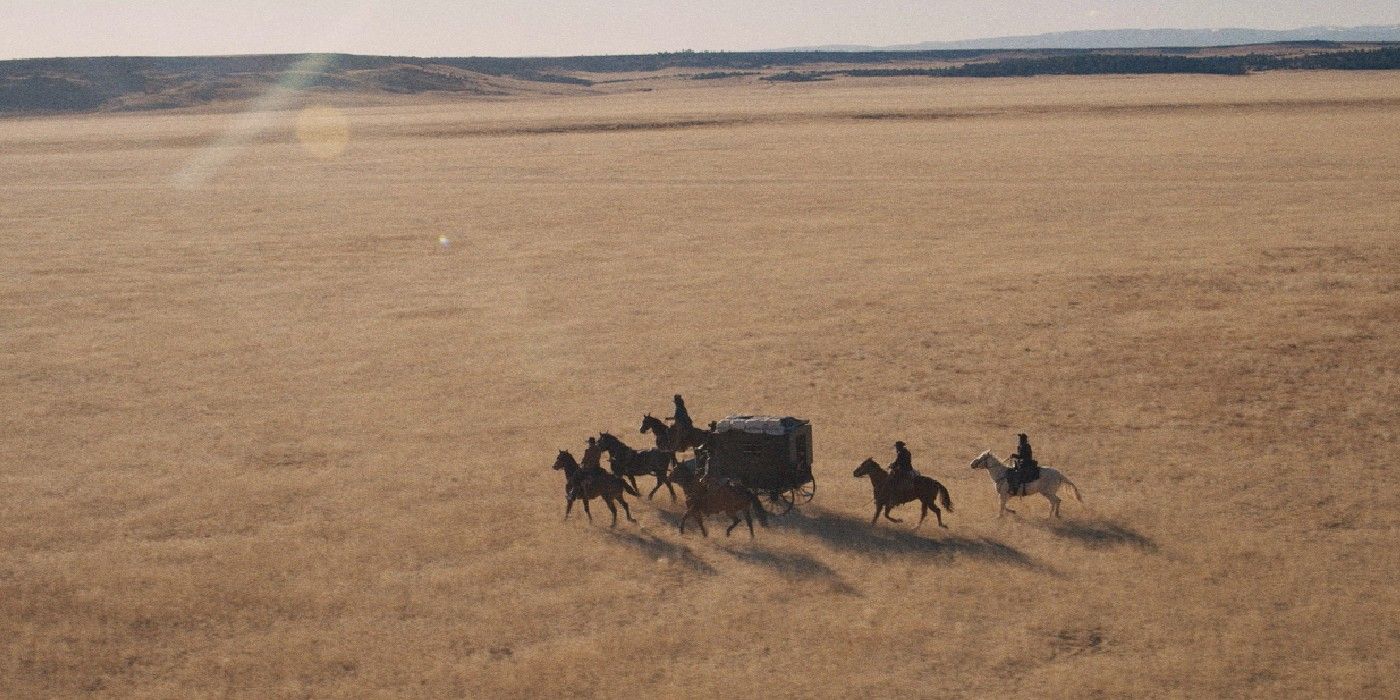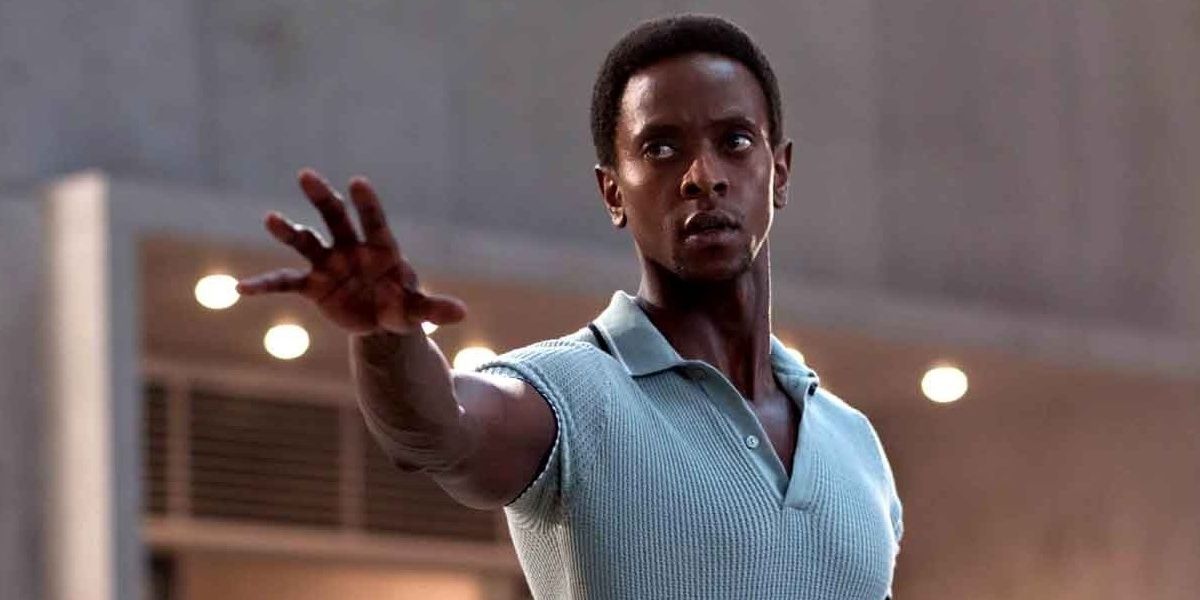The Western genre gets a breath of fresh air with Netflix’s The Harder They Fall, which is currently in theaters and premieres on the streaming service November 3. The story follows outlaw Nat Love (Jonathan Majors) as he brings his gang back together to take revenge on Rufus Buck (Idris Elba), the man who murdered his parents.
Edi Gathegi (X-Men: First Class), who stars as real-life rodeo performer Bill Pickett, spoke to Screen Rant about what the story means to him.
Screen Rant: Can you just talk to me about when you first got this script? What really jumped out at you?
Edi Gathegi: Well, the first thing that jumped out of me was the very obvious thing, which is every character was Black. I thought that was a really interesting premise. Then it turns out that it's a really important premise because Black people existed in the west and they're so rarely depicted. This movie does something that's quite clever because it actually uses real historical figures that actually lived and it repurposes them into the telling of this tale. There's a little history lesson in it as well.
Tell me a little bit about your character Bill Pickett.
Edi Gathegi: He's self-described as proud. He's described as a hothead, and he definitely has the ability to be a hothead, but he's also surrounded by a bunch of hotheads. So among the hotheads, I would say that he's actually the cooler head that prevails. He's loyal, perhaps loyal to a fault. Grounded. I would say he's maybe the moral compass of the crew. He's a sharpshooter; that's his bag of tricks is that he's the one that watches over everybody makes sure that his gang is safe. He's the evil eye.
Can you talk to me about his relationship with Jim Beckwourth played by R.J. Cyler?
Edi Gathegi: There wasn't a lot of backstory that was written in the script. So RJ and I had to just get together and try to figure out who we were to each other. We came up with some really fun things that allowed us to dig a little deeper on the days. I guess they just become best friends. It started off as sort of a mentor-mentee relationship, and then it evolved into a peer relationship. Then at this point in the telling of our tale, they're basically brothers, and they would die for each other.
So you and RJ kind of created that own backstory amongst yourselves?
Edi Gathegi: You got to do that as an actor, and fill in the gaps, because the screenplay will lay out only what it lays out, and then you have to do the other heavy lifting on your own. Since we're supporting Nat, there's not a lot of backstory that was given to us. RJ has a little bit in the film, but everything else we just get together and figure out what we can attach to what makes sense, what fuels each scene.

I wanted to ask you about this crew that's put together with Nat Love played by the great Jonathan Majors. You talked about your character being the one that keeps a cooler head, but can you talk about the other members of this crew?
Edi Gathegi: Nat Love is fiery. He's seeking revenge. He's almost blinded by it. It's very hard to contain him or give him any kind of perspective that he's willing to listen to cause he's on a mission for that revenge. To that end, we came up with a backstory for our characters as well, because the big question is where does this loyalty come from? Let's go back in time and figure out who we were to each other. We came up with some juicy things that allowed us to again hook into these characters and help us do the telling.
I want to talk about your director, Jeymes Samuel. He has such an amazing eye, and he's also a great writer. Can you talk to me about working with him as a collaborator?
Edi Gathegi: He's been working on the film for a long time, many years, and it's very close to him. He knows the material inside and out, and when you're working with the director who has that clear of a vision of what it is that they want your job as an actor is to get out of the way and just be in service of the story that they're trying to tell. So my approach was just, if he's happy, then we’re happy. Whatever notes he wants to give, you say yes, and then you figure out how to give it.
I wanted to ask you a little bit about Nat Love. He was a real cowboy in the Old West, he had an autobiography called The Life and Adventures of Nat Love: A True History of Slavery Days. Did you end up researching Nat Love at all to help inform the story or inform the surroundings?
Edi Gathegi: I did a superficial history lesson with all the characters in the movie just because they're fascinating. I knew some of them beforehand, and some of them I was being introduced to for the very first time. That's also what's great about this project is these characters really did exist. It's an opportunity for people who are interested to go and pick up a book and learn about these historical figures and their contributions to American culture.
During your research was there anything you stumbled across that you found really fascinating?
Edi Gathegi: Well, I knew about my character, but I didn't know that my character actually died by getting kicked in the head by a horse, which is a pretty tragic way to go.
He invented bulldogging, which I heard that word, but I didn't know exactly what it meant. When Bill Pickett was young, he watched a dog bite the lip on a bull and bring it to its knees. He just decided to imitate that. That's what he would do. He would bite the bottom lip of a bull and bring it to its knees. He invented that bulldogging style of rodeo.

Can you talk to me about being on this Western set and immersing yourself in that world?
Edi Gathegi: What's cool about shooting a Western is you're out there, out on the range, you're in that beautiful landscape and we had to learn how to ride horses. We picked up new skills along the way. It's Netflix, they got money. All these true-to-scale real-life Western sets. Almost from the ground up, they built this town. I mean there was some bones there, but they really went to work and it gave us a really distinct time and place. You can't be on that set without feeling like you're of that time. That goes a long way to the believability of us as artists in each scene.
I can't overlook this star-studded cast. It is a who's who of Hollywood. Can you talk to me about the camaraderie that was on set with this cast?
Edi Gathegi: I thought we would probably approach this from a "the good guys don't talk to the bad guys" type of set. And I was prepared for that, but everybody was so damn cool.
Idris Elba is so cool. I think one of the very first things that I did was this little small independent project. I did it with Idris. I don't know if he was on The Wire yet, but him years, years, years ago. I hadn't seen him in a long time, but we're friendly, and LaKeith Stanfield and his crew, and he become a really close friend of mine and Regina King.
I've just been a fan of hers and there's no one more elegant, just talented, just humble, smart, insightful, kind, I can't say enough good things about Regina King. So the bad guys were actually dope. It was hard not to want to be friends with them.
And by the way, their mission in the film, there's a lot of merit to what they're trying to do. So I think that is just in the eye of the beholder, everybody's got their reasons.
I want to go back to Jeymes Samuel for a second because I know that he had been working on this for a long time, and I know that he's a huge fan of Westerns. But as a writer, how much does it help your performance, having the same person directs you know the material so well?
Edi Gathegi: In a lot of ways it takes the pressure off, because when you know that the writer is also the director and they've been sitting with this project for a decade, you just trust. You signed on to this, you see who else signed on to it, the caliber of everybody who's involved. At that point, it's just really easy to just trust, and then that in some ways takes the pressure off of you. Just show up and they hired you for a reason. Do what they say.
What are you hoping people will take away from the film?
Edi Gathegi: Hopefully this film, and I believe that it's already happening, adds to this conversation of representation and inclusion. The first Western cowboy novel was written in 1902. It was called The Virginia by a man named Owen Wister. And he was a white man. He was writing for a white audience. And that set the tone for novels in the genre and filmmaking in the genre.
Jim Beckwourth was a Black trapper and cowboy and a whole host of other things, but he was depicted in early cinema as a white man. So there was just the erasure of people of color. They've always been there. One in four Cowboys was black. For them to exist so infrequently in cinema and in books, it was a purposeful erasure. Right now we're just attempting to right, almost a century of wrongs with regards to cinema.
Hopefully blowing the doors open and we're entering the conversation saying black Cowboys existed. And when we do a Western, we better see some Western characters of color.

Last question I have for you. Darwin is one of my favorite X-Men characters. I was not happy the way that Darwin was treated in the franchise. What are the chances that you'd be up for reprising either another Marvel character or even Darwin?
Edi Gathegi: I always felt that Darwin got the wrong end of the stop. His character was underutilized and he met a demise that was illogical. If I'm being frank, just the visual achievements that could have happened just in terms of him adapting to survive, put that ability in a narrative and the possibilities are endless.
I didn't know who he was before I got that part, but he easily became a favorite X-Men and I grew up loving Wolverine. But Darwin is a cool ass character. If the opportunity ever arose to have redemption, I would love that. I'm just a fan of Marvel, I grew up reading comic books and watching comic book cartoons. So, that's just something that I enjoy.
It was a dream come true to play Darwin and to be in the X-Men franchises. If I got another chance to join, then of course. #Redemption4Darwin
from ScreenRant - Feed https://ift.tt/3nK7jNn


0 Comments